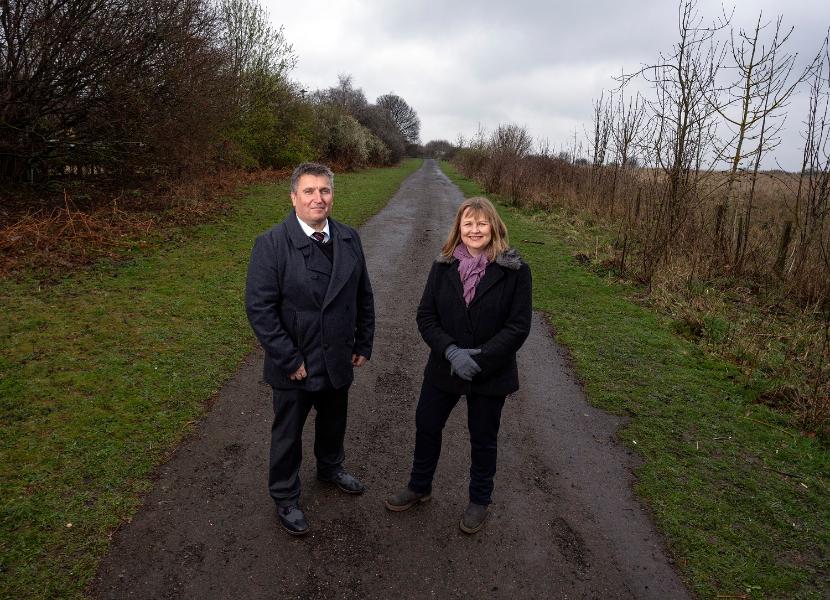Walking and cycling schemes en route in County Durham
Work to identify potential improvements to walking and cycling infrastructure has been carried out in more of County Durham's main towns and villages.

Mark Jackson, our head of transport and contract services, and Cllr Elizabeth Scott, Cabinet member for economy and partnerships.
Such plans have already been adopted for Durham City, Chester-le-Street and Newton Aycliffe and are part of a major programme of work we are delivering to encourage active travel.
Cllr Elizabeth Scott, our Cabinet member for economy and partnerships, said: "Improving active travel infrastructure across County Durham is a real focus for us. Making it easier for people to walk and cycle benefits their health and wellbeing as well as the environment by reducing reliance on cars which reduces carbon emissions.
"It is also very much in line with our new Inclusive Economic Strategy as it improves connectivity, helping people get to work, the shops and leisure and cultural sites.
"We are really pleased to have carried out work in eight more of our main centres and, should Cabinet adopt them, we look forward to the plans forming the basis of future funding bids."
The meeting on Wednesday 14 June will hear how the government's Cycling and Walking Investment Strategy (2017) recommends that local authorities prepare LCWIPs.
These are an evidence-based strategic approach to identifying cycling and walking improvements required to facilitate increased active travel for everyday journeys. They represent "a robust approach for prioritising investment in walking and cycling infrastructure in the short, medium and long term," a report to Cabinet sets out.
Councillors will be reminded that the previously adopted Strategic Cycling and Walking Delivery Plan 2019-2029 sets out our commitment to producing the plans for the county's 12 main towns.
Plans help attract funding
LCWIPs "support the county council with making the case for future funding, particularly as the government is prioritising funding for those authorities which have developed such plans," the report continues.
Members will hear that the first three LCWIPs were adopted in October 2021.
On the back of that, we secured £177,586 funding from the government's Active Travel Capability Fund to continue the work across our nine other main centres. The money was also to allow us to develop an 'LCWIP Lite' methodology which is a streamlined approach to developing plans for rural routes and smaller settlements.
At the meeting councillors will be asked to formally adopt eight new plans, following work in Bishop Auckland, Consett, Crook, Peterlee, Seaham, Spennymoor, Shildon and Stanley.
The 12th main settlement, Barnard Castle, will become the first LCWIP Lite town, with its plan including proposals better suited to the rural nature of the area.
Should the plans be adopted, we will take priority routes from the eight town LCWIPs to the outline design stage, and further develop the LCWIP Lite methodology. Work will also be carried out on proposed routes within five miles of the Durham City project.
Active travel activity
LCWIPs form "an important part" of the overall work we are doing to encourage active travel, the report states.
Across the county, we are delivering many infrastructure schemes, projects, campaigns and initiatives to enable and encourage more people to walk and cycle as an active mode of transport.
This is both as part of our long-term approach, through the Strategic Cycling and Walking Delivery Plan 2019-2029, and in response to new opportunities and funding bids developed by us and through partnership working.
These include short, medium and long term schemes and projects from local path improvements to large scale schemes.
Work has been funded variously through our Local Transport Plan and Towns and Villages walking and cycling programme, and several government streams including Transforming Cities, the Levelling Up fund and the Capability and Ambition Fund.
The Department for Transport's Active Travel Fund has financed schemes in and around Durham City and Newton Aycliffe that were developed in response to the coronavirus pandemic, while the department has similarly funded improvements to two stretches of the National Cycle Network through the county: routes one and fourteen.
Work has also taken place at the Great North Cycleway (NCN725) while we have developed travel plans, as well as Borrow a Bike and Love to Ride schemes.

 Share this page on Facebook
Share this page on Facebook
 Share this page on Twitter
Share this page on Twitter
 Print this page
Print this page





